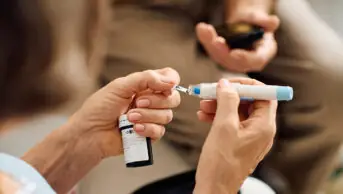
Shutterstock.com
More than 20 million antidepressants were prescribed between October and December 2020 — a 6% increase compared to the same three months in 2019 — according to statistics reported by the NHS Business Services Authority (NHSBSA).
Overall, the statistics showed that 23% more patients received an antidepressant item in the third quarter of 2020–2021 compared to the same quarter in 2015–2016.
But an NHSBSA report on the statistics noted that, across 2020 as a whole, the rate of increase in antidepressant prescribing slowed, with fewer items prescribed than would have been expected based on 2019 trends.
The quarterly statistics, published on 4 March 2021, describe primary care prescribing of medicines used to improve mental health in England, which are subsequently dispensed in the community.
The statistics cover five categories of medicine: hypnotics and anxiolytics; drugs used in psychoses and related disorders; antidepressant drugs; central nervous system stimulants and drugs used for attention deficit hyperactivity disorder; and drugs for dementia.
Antidepressants “have been steadily increasing in usage since 2015”, the report said, with 20.5 million antidepressant drug items prescribed between October and December 2020, compared with 19.3 million items during the same three months in the previous year.
The report also considered the impact of the national COVID-19 lockdowns implemented between 23 March 2020 and 4 July 2020, and 5 November 2020 to 2 December 2020.
All of the drug groups observed a larger increase in monthly prescribing — on average five percentage points — between November and December 2020 compared to the same period in 2019.
For psychoses and related disorders, 3.32 million items were prescribed in the last three months of 2020; a 3.6% increase from 3.2 million items prescribed in the same three months of 2019.
However, overall prescribing of drugs for dementia continued to show a downward trend, with 1.02 million items prescribed between October and December 2020 compared to 1.08 million items in the same months of 2019.
Ciara Ni Dhubhlaing, president of the College of Mental Health Pharmacy, said that it was “worth noting” that most antidepressants are licensed to treat both depression and anxiety.
“The increase in prescribing correlating with the lifting of lockdown restrictions in July [2020] is interesting as it may suggest that it may not be lockdown alone that is the issue but rather the many stressors related to the pandemic,” she said.
“In clinical practice, I have seen a large increase in anxiety disorders, including social anxiety and panic attacks, amongst those with no previous history of mental health difficulties as well as those with an anxiety disorder diagnosis.”
Dhubhlaing also highlighted the large increase in prescribing of antipsychotic medications without there being a comparable increase in the number of patients, saying that it “may suggest that people with established diagnosis of psychosis are struggling”.
“Many day services and support groups have not been available during pandemic restrictions and, in practice, I have found people with psychosis to be less inclined to use technological alternatives to face-to-face interaction as compared to people with mood disorders,” she said.
David Taylor, director of pharmacy and pathology at the Maudsley Hospital in south London, said that social isolation and fear of contracting the virus were both likely to increase rates of depression and anxiety and, subsequently, the number of antidepressant items prescribed.
“In this context, the rise in antidepressant prescribing is not unexpected. Although antidepressants are effective, they are not innocuous,” he said.
“Sudden cessation of treatment may lead to withdrawal symptoms and to an increased risk of relapse. Ideally, rates of prescribing should gradually fall as the lockdown eases.”


